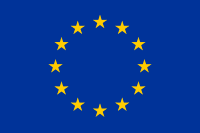Steven Hill is a political writer and director of the Political Reform Program at the New America Foundation. He has appeared on numerous national and local radio and television programs. His latest book is: “Europe’s Promise: Why the European Way Is the Best Hope for an Insecure Age.” He presented in Seattle on March 15, 2010.

The two flags present quite a contrast, don’t they? One, the Stars and Stripes, also known as Old Glory — the other, the European Union’s royal blue with a circle of twelve gold stars, like a halo.
While Europe is considered the “old world,” the United States actually is far older than the European Union. The E.U. is the new kid on the block, a fundamentally different “Europe,” reconstructed from the rubble of World War II with America’s generous assistance.
 Because modern-day Europe is so new and still in formation, it is frequently misunderstood by Americans. Journalists can’t figure out if Europe is a single nation or a confederacy of individual nations. Increasingly the answer is ‘both,’ and that is confusing to many reporters who don’t quite know how to report on Europe because of this duplexity.
Because modern-day Europe is so new and still in formation, it is frequently misunderstood by Americans. Journalists can’t figure out if Europe is a single nation or a confederacy of individual nations. Increasingly the answer is ‘both,’ and that is confusing to many reporters who don’t quite know how to report on Europe because of this duplexity.
As a result, numerous myths and half-truths about Europe now pass as conventional wisdom, and these myths have clouded Americans’ perceptions and understanding:
Myth 1: Europe has a weak, sclerotic and noncompetitive economy.
Myth 2: Greece and the other PIIGS countries are going to bring down Europe.
Myth 3: The European “welfare state” hamstrings its businesses.
Myth 4: Europeans pay more taxes than Americans.
Myth 5: Europe is a socialist nest of government interference and intervention.
Myth 6: Europe has a lower standard of living than the United States.
Myth 7: Europe’s economy will be hurt by its inadequate domestic energy supply and its dependence on Russia for its energy needs.
Myth 8: Europe is not as innovative or as technologically advanced as it needs to be.
Myth 9: Europe is weak on the global stage, lacking international power.
Myth 10: Europe’s future looks bleak, since it is both being flooded by too many Muslims, turning Europe into ‘Eurabia,’ as well as its population is dying out.
Over the next week, I’ll be exploring — and debunking — each of those myths in a series of posts here on Washington Policy Watch. Stay tuned!
– Steven Hill, guest blogger
Ed. comments:
You can see all the posts in this series here.
Steven Hill is the author of “Europe’s Promise: Why the European Way is the Best Hope in an Insecure Age” (www.europespromise.org). He’ll be visiting Seattle and Bellingham next week:
- Monday March 15 at 11 a.m., interview on the Dave Ross Show, KIRO 97.3 FM
- Monday March 15 at 7 p.m., presenting at the University of Washington Communications Building
- Tuesday March 16 at 7:30 pm: presenting at Town Hall Seattle (tickets here)
- Wednesday March 17, 7:00 p.m.: presenting at Village Books, Bellingham
More To Read
September 24, 2024
Oregon and Washington: Different Tax Codes and Very Different Ballot Fights about Taxes this November
Structural differences in Oregon and Washington’s tax codes create the backdrop for very different conversations about taxes and fairness this fall
September 10, 2024
Big Corporations Merge. Patients Pay The Bill
An old story with predictable results.
September 6, 2024
Tax Loopholes for Big Tech Are Costing Washington Families
Subsidies for big corporations in our tax code come at a cost for college students and their families
